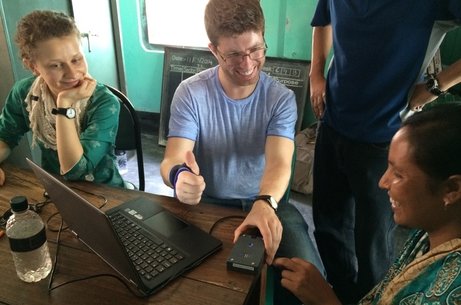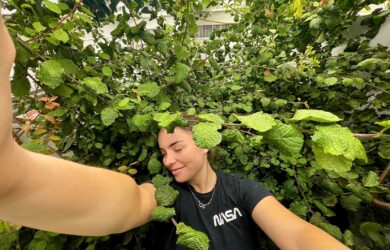
The pioneering fingerprint identity device has been covered by a peer-review journal and is up for several awards.
A pocket-sized fingerprint scanner that links individuals’ fingerprints to their health records has been created by a team of students and has the potential for widespread health benefits, according to a new study.
In an article in the peer-review journal Global Health: Science and Practice, four students – three of them Gates Cambridge Scholars – outline how SimPrints addresses a major problem in developing countries: the inability to uniquely identify clients impedes access to services and contributes to inefficiencies. The scanner works by wirelessly syncing with a health worker’s smartphone.
The students – Daniel Storisteanu, Alexandra Grigore and Toby Norman from the University of Cambridge and Tristram Norman from the Royal Holloway, University of London – say the benefits of the SimPrints system include high accuracy and secure identification, fast access and modification of records, allowing health workers in the field to make better decisions by providing immediate and reliable access to critical medical information, increasing programme accountability by facilitating the measurement of indicators such as vaccination coverage and supporting civil registration and vital statistics systems by enabling tracking of vital events (such as births).
In areas where connectivity in the field is poor, the students say the SimPrints system can access and modify offline health records that have been previously downloaded and are stored in a local database on the phone. Any updates to the health records will then be synced with the central database once Internet connectivity is restored. In order to increase access to charging points and make it easier to replace parts, the SimPrints scanner uses the same BL-5C Nokia batteries commonly used in mobile phones globally.
They say challenges remain in fingerprint identification of infants, the elderly, and individuals with worn fingerprints due to manual labour. Current strategies used to prevent the exclusion of services to these individuals include connecting an infant’s record to the fingerprints of their legal guardians and enrolling multiple fingerprints for manual labourers and the elderly to increase matching accuracy, as well as using secondary identification tags, such as their name or location, as a back-up.
Pilot study
Supported by funding from the Saving Lives at Birth innovation grant and ARM Ltd, the SimPrints team are conducting a pilot study in partnership with BRAC and the Johns Hopkins Global mHealth Initiative to test the system with health workers in Gaibandha, Bangladesh. The study is focusing on threshold testing to assess false positive, false negative, and failure-to-enroll rates, and research on performance analysis, usability, acceptability, usage patterns, and key health indicators such as the number of successful antenatal health visits. The technology is also being piloted in Mozambique.
Professor Alain Labrique, Director of the JHU Global mHealth Initiative, expressed his enthusiasm for the project saying, “This is a very exciting initial investment into a promising technology that addresses a key bottleneck in global health programs. As we struggle to identify ways to strengthen vital registration systems that improve our ability to deliver care to every person who needs it – knowing who someone is and being able to pull up their prior health record is a real game changer for the footsoldiers of global health.”
The idea for SimPrints came through a global health competition where teams of students had to address different health challenges. SimPrints won the competition and Toby Norman formed a development team which sought funding through various grant initiatives. Last year the team won funding of $250,000 from the Bill and Melinda Gates Foundation’s Saving Lives at Birth competition and $180,000 from Cambridge-based ARM Ltd, whose technology is incorporated in over 95% of all the world’s mobile phones. It is up for several awards, including start-up of the year at the Business Weekly Awards and is entered in the UKAID Direct competition whose results will be revealed in mid-March.
Toby Norman, who is doing a PhD in Management Studies, said: “Despite the incredible potential of mobile health to improve lives, accurately linking a patient to their health records has proved a critical stumbling block in too many projects. This technology can ensure that even the poorest have the right to an identify within health systems.”
A new film of how SimPrints was formed and its current pilot work can be found here.












